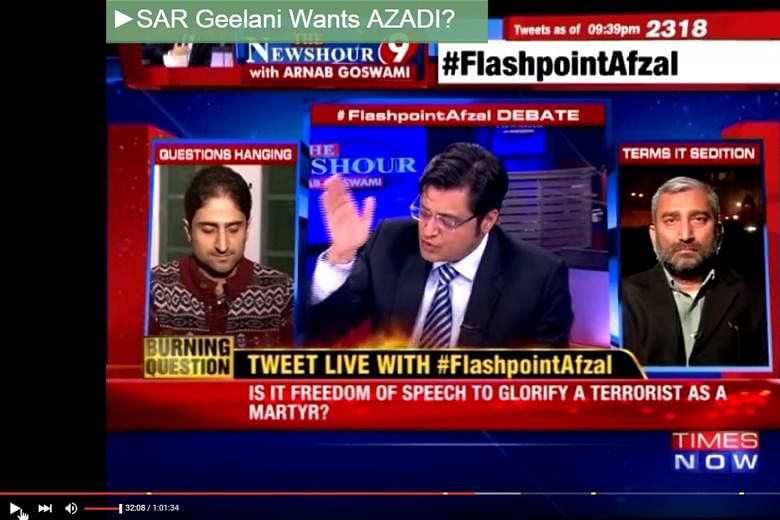The Indian media is known for its aggressive pursuit of news, but coverage of the ongoing sedition cases against three university students by some television channels has sparked controversy over whether the line has been crossed in packaging opinions as news.
Sedition charges were filed against Jawaharlal Nehru University (JNU) students' union president Kanhaiya Kumar and two other students, Umar Khalid and Anirban Bhattacharya, for apparently shouting anti-national slogans at a meeting on Feb 9 in support of Kashmiri separatist Afzal Guru.
Guru was hanged in 2013 for the 2001 attack at the Indian Parliament which killed 14 people.
All three students have denied the charges, and their arrests triggered a heated debate on the right to dissent and freedom of expression in the world's largest democracy.
The debate was fuelled by the Indian media, with certain channels calling the students "anti-nationals". Hindi news channel Zee News and Times Now, a leading English channel, faced criticism for airing unverified footage of the Feb 9 meeting. A Delhi government probe found parts of the footage to be doctored.
But the coverage of the case also brought about some introspection.
"Television has become sick," said well-known television anchor Ravish Kumar of Hindi-language news channel NDTV India in a special broadcast which blacked out visuals in protest over the coverage. "This darkness is the picture of television today."
India has over 80 news channels in English, Hindi and other Indian regional languages, resulting in a fierce fight for viewership.
Channels often push reporters to get the news before their rivals and routinely run stories with the tagline "breaking" or "exclusive news".
The mainstay of the channels are the prime-time debate shows which have made stars out of the anchors who host them, like Times Now's Arnab Goswami, who has previously said he is merely following the "journalism of opinion".
A typical prime-time news debate on some channels often dissolves into a slanging match where the anchor forcefully puts his views across.
"Television is going through a crisis. The channels are competing for breaking news and, as a result, issues are often blown out of proportion. There is already a preconceived notion," said Dr Bhaskara Rao, director of the Delhi-based Centre for Media Studies. "And some of the news channels are vitiating public opinion. This is why the credibility of print has gone up."
Television producer Vishwa Deepak, who resigned last month from a Hindi-language channel over coverage of the sedition case, noted in a letter posted online: "We succeeded in tarring Kanhaiya and many other JNU students as anti-national in the eyes of the people. If one of them is lynched tomorrow, who will be accountable for it?"
Others say television journalism in India is still at a developmental stage and efforts are being made to improve coverage.
"Yes, quality in prime-time studio discussions is not that good, but we give volumes of information. We are trying to develop debates into well-informed discussions," said Mr N K Singh, a television journalist and general secretary of the Broadcast Editors' Association, which includes representatives of Zee News and Times Now.
"There are predicaments but, by and large, we are doing our job well."

